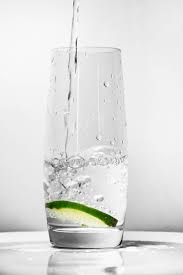How to keep cool and look good during a heatwave
How to keep cool and look good during a heatwave
I don’t think that it’s too optimistic to state that we are in the middle, or hopefully the start of a heatwave in the UK. It’s also fair to say that many people are ill prepared for the hot weather and can feel the effects of the heat and the sun quite dramatically. I’ve put together a few tips and guidance on how to cope with the current high temperatures.
Water, Water, Everywhere!
 Water makes up around 60% of our bodies, so it’s important to replenish the water lost through perspiring during hot weather. You should aim to drink at least 1.5 litres each day in average temperatures, so it makes sense that you will need to consume more when it’s hot. The volume you should drink will depend on your activity levels too, so do take this into account. If you’re not keen on plain water, add slices of lemon, lime or cucumber for a refreshing hydrating drink.
Water makes up around 60% of our bodies, so it’s important to replenish the water lost through perspiring during hot weather. You should aim to drink at least 1.5 litres each day in average temperatures, so it makes sense that you will need to consume more when it’s hot. The volume you should drink will depend on your activity levels too, so do take this into account. If you’re not keen on plain water, add slices of lemon, lime or cucumber for a refreshing hydrating drink.
However, around 20% of water is consumed from the food we eat every day, 80% of that from fresh fruit and vegetables. So there are many ways to make sure your body is getting enough water to function properly. A mixture of fresh whole fruit, vegetables, cordials, tea, milk and of course water etc. is best.
Consuming the right amount of water regularly throughout the day, is good for your vital organs, in particular your brain. If you’re dehydrated, you can’t think straight and everyday tasks like decision making or concentrating might become difficult. Here a just a few other benefits of drinking water:
- Replaces the water you’ve lost
- Helps digestion
- Helps blood circulation
- Keeps your joints moving
- Increases athletic performance
- Improves focus and concentration
- Beats tiredness
- Encourages you to eat less
- Won’t rot your teeth
Although your body will absorb water from whatever you eat and drink, there are some drinks to avoid. These are diuretics that make your kidneys expel (wee out) more than you drink and you’ll be losing vital fluids and nutrients that your body cells need to stay healthy. Ones to avoid or reduce intake of are:
- Alcohol of any form – It can be difficult to avoid sometimes, so drink the equivalent in water as you go along to counter the loss of fluids (and nutrients).
- Coffee – keep consumption to perhaps one or two cups each day and in between drink water.
- High sugar fizzy drinks – these give the body too much sugar at once and can cause sluggishness and fatigue after the initial hit, not to mention tooth decay.
Looking good when it’s hot, hot hot!
It’s very tempting to become a sun worshipper from day one of a forecasted heatwave. We’re really not used to the sun sticking around for too long in the UK, so people want to make the most of it.
The reality of taking in too much sun can usually be seen in the bright pink, red, or even scarlet coloured skin on show. I look at in a ‘say what you see’ kind of way. You burnt your skin! However, 15 minutes sun exposure to bare forearms and face each day gives you enough vitamin D (the happy vitamin) to supply your liver that will then release it when it’s dull weather. No wonder people who live in hot countries are so happy!
Too much sun, and heat, can over heat your body internally and externally too. Just like a chicken in the oven, you’ll be roasting yourself if you stay in it too long.
Top tips for keeping cool during hot weather.
 Don’t stay out for too long – Between 11 am and 3 pm the sun is at it’s hottest, so best to avoid direct sun.
Don’t stay out for too long – Between 11 am and 3 pm the sun is at it’s hottest, so best to avoid direct sun.
Wear a hat – keeping your head covered in a light coloured brimmed hat or scarf really does reflect the heat away from your head/hair, keeping you cooler. Especially important if you have no hair!
Keep covered up – like the hat, wearing light coloured loose clothing keeps the heat from your skin. Avoid synthetic materials though, they may make you sweat more.
Know your limits – before you start to turn pink, get out of the sun and into the shade.
Wear the right sun protection for your skin – Aim for a high factor to avoid burning.
Above all, keep hydrated and cool and enjoy this lovely weather sensibly. The NHS have enough to do.



